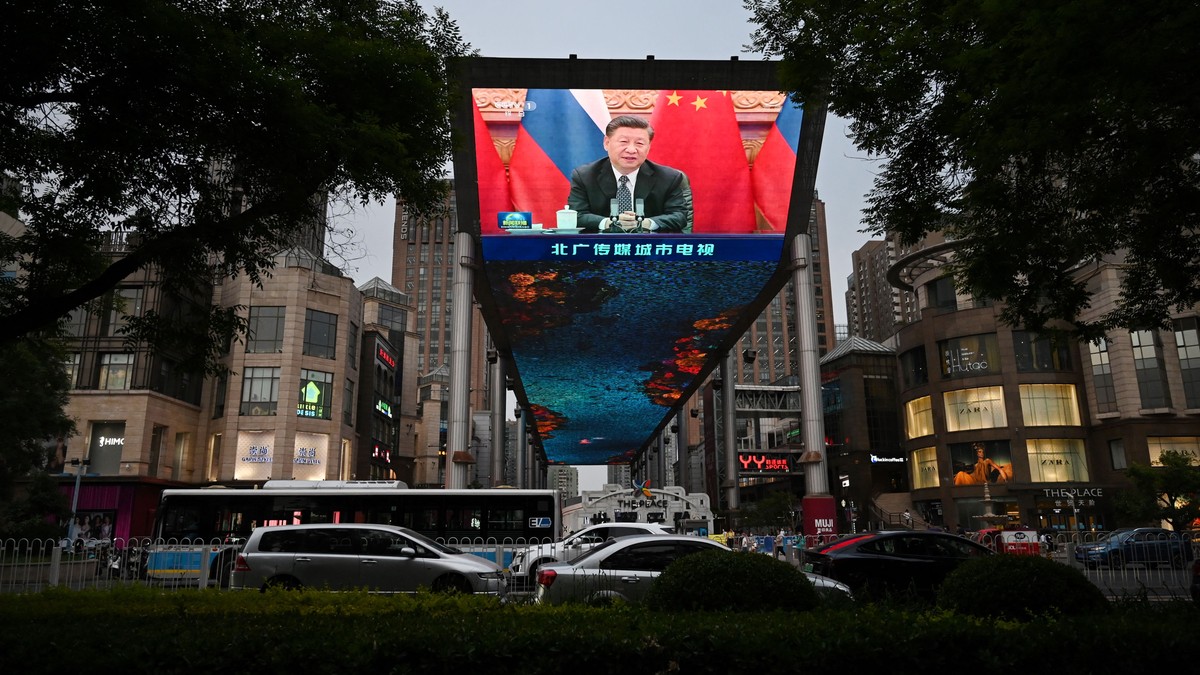[ad_1]
Would-be viewers of the long-delayed historic drama “A Love By no means Misplaced” had been left dissatisfied Monday when the present was pulled simply two hours earlier than its premiere. The published was changed with a rerun of a 2020 “poverty alleviation drama” loosely primarily based on a program pioneered by Xi Jinping whereas he held provincial workplace. Six episodes of “A Love By no means Misplaced” briefly appeared on Chinese language streaming websites earlier than they, too, had been taken offline. On Weibo, the showrunners cited “technical points,” however followers suspected a special wrongdoer: “historic nihilism,” a catch-all time period for depictions of historical past out of line with Celebration orthodoxy. The male protagonist of “A Love By no means Misplaced,” Liang Xiang, is modeled after the late Manchu nobleman Liangbi, who led the hassle to crush the 1911 Wuchang Rebellion that sparked the Xinhai Revolution and finally led to the autumn of the Qing Dynasty. In Chinese language Communist Celebration historiography, the Xinhai Revolution is hailed because the occasion that “ignited hope for a revitalized China.”
Historic tv dramas occupy a delicate spot within the Chinese language leisure sphere. In 2019, the State Administration of Press, Publication, Radio, Movie and Tv quickly banned the manufacturing of “entertainment-driven” historic dramas. The wildly in style palace dramas “Story of Yanxi Palace” and “Ruyi’s Royal Love within the Palace,” each fictionalized accounts of life underneath the Qing Dynasty’s Qianlong Emperor, had been pulled from streaming companies and lambasted in state media as being “incompatible with core socialist values” resulting from “sins” resembling “[fetishing] the imperial life-style” and “[idolizing] emperors and officers of the feudal previous.” In 2021, decidedly “Crimson-themed” historic tv dramas started to dominate the display screen. “Minning City”—the aforementioned “poverty-alleviation drama” that stood in for the premiere of “A Love By no means Misplaced”—was among the many hottest exhibits throughout the first half of that yr. “The Age of Awakening,” which traced the Could Fourth Motion and the rise of China’s nascent Communist Celebration, inherited that present’s mantle over the latter half of the yr, incomes each vital and in style acclaim. Each exhibits are zhengju, “optimistic dramas” saturated with pro-Celebration vitality, but not so sanitized as to be staid. The recognition of those Crimson-themed zhengju is extra complicated than it could appear. As argued by He Tianping in Sixth Tone, utilizing the 2017 anti-corruption drama “In The Identify of the Folks” for instance, zhengju are in style exactly as a result of they permit viewers to “meme-ify” historic durations which are typically off-limits in public dialogue:
However zhengju showrunners are additionally discovering that up to date viewers are hardly ever glad with passively consuming their work; as an alternative, followers are repurposing optimistic dramas, turning them into memes that subvert and even outright contradict the sequence’ authentic objectives.
[…] As this on-line subculture evolves and goes mainstream, secondary content material has change into more and more imaginative. The “meme-ification” of exhibits displays the methods wherein at present’s audiences draw parallels between works of tv and completely different cultural contexts or social realities. Within the means of consuming media, they’re contributing to its creation and reinterpretation — even media with severe political connotations and historically little room for different interpretations.[…] If the present revolved round politics, corruption, and sophisticated institutional energy struggles, viewers’ reinterpretations of the sequence tended to eschew these dynamics in favor of idolizing a person, Li, caught between the Celebration’s beliefs and the realities of Chinese language improvement. Though this hardly turns the present on its head, it nonetheless subverts the textual content of the script. [Source]
For now, authorities appear unconcerned with this pattern. Certainly, an April Beijing Every day editorial expressed approval for the return of historic dramas so long as they “revert” to zhengju that draw the “appropriate” classes from dynastic historical past:
“The Imperial Age,” a coming-of-age story in regards to the Ming Dynasty Hongwu Emperor’s fourth son Zhu Di [later the Yongle Emperor], is presently successful present on Beijing Satellite tv for pc TV. As one of many few historic dramas to air lately, its grandeur has captivated viewers and earned it excessive reward. Historic dramas reversion to zhengju kind each adheres to coverage steerage and fits the calls for and tastes of up to date audiences.
[…] Market-oriented historic costume dramas grew to become the style when producing zhengju historic dramas proved tough. From “The Eloquent Ji Xiaolian” sequence to at present’s costume dramas that mix historical past and “idol tradition,” empresses and emperors have been the main protagonists of historic dramas, a pattern that has almost all the time incurred viewers criticism. These dramas are seen as over-the-top, traditionally inaccurate, and even deceptive. A deluge of such exhibits has made it tough for historic dramas to get previous the censors. [Drama critic] Yang Wenshan revealed that previously few years, all historic dramas with fictionalized plots have been required to endure in depth rewrites. As such, historic dramas that embrace commercialism and eschew conventional zhengju storytelling strategies, however are nonetheless capable of meet broadcasting requirements, have change into more and more uncommon.
[…] Zhengju historic dramas have shaken off their previous torpor: as soon as eschewed by younger audiences as relics of the previous, at present they’ve cultivated a viewership able to appreciating their storytelling aesthetic. Historic dramas presently in manufacturing ought to grasp the chance of this new period and respect historical past whereas additionally putting significance on innovation, to create new glory for zhengju historic dramas. [Chinese]
“A Love By no means Misplaced” was talked about within the above piece as an exemplary new-era “optimistic” historic drama. So what went improper? The Hong Kong publication Sing Tao Every day quoted mainland filmmaker Hailin Wang’s hypothesis that the sequence was shelved as a result of it was centered across the character of Liang Xian, modeled on Qing royalist Liangbi. Commentator Zeng Pengyu concurred, arguing that spotlighting a “counter-revolutionary determine” like Liang because the protagonist would possibly lure youth into historic nihilism, probably inflicting “doubt and vacillation about main nationwide, ethnic, and historic questions.” On-line hypothesis homed in on related points. On Zhihu and Douban, posters debated whether or not casting Liang Xiang because the protagonist was an endorsement of “royalism” and thus counter-revolutionary. One Sohu essayist argued that it was a very good factor the present had been pulled, arguing that it “whitewashed” the Manchu Qing Dynasty. The essay included a screenshot of a Weibo put up whereby a fan of the present wrote: “Historical past isn’t essentially the reality. Historical past is written by the victors. Who wouldn’t need to write it as they please?”
The official Weibo account for “A Love By no means Misplaced” has lain dormant since claiming the present was pulled for “technical points” and asking followers for endurance. That put up is paying homage to one other from on-line e-commerce celeb Li Jiaqi, whose livestream was shut down after he displayed an ice-cream cake with a putting resemblance to a tank on the eve of June 4. Li has but to renew his livestreams. The destiny of “A Love By no means Misplaced” appears equally unclear.
[ad_2]
Source link




